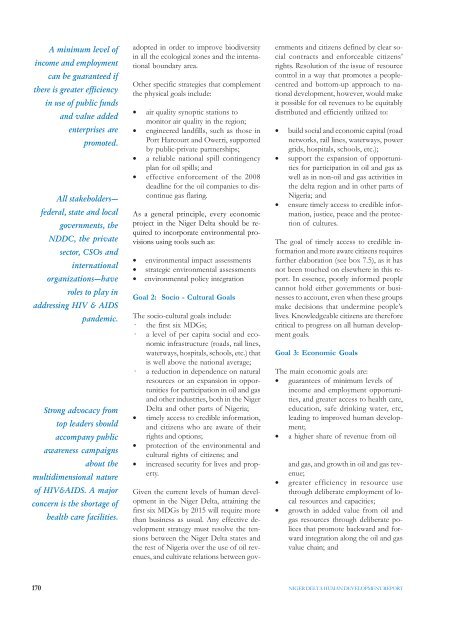Niger Delta Human Development Report - UNDP Nigeria - United ...
Niger Delta Human Development Report - UNDP Nigeria - United ...
Niger Delta Human Development Report - UNDP Nigeria - United ...
Create successful ePaper yourself
Turn your PDF publications into a flip-book with our unique Google optimized e-Paper software.
A minimum level of<br />
income and employment<br />
can be guaranteed if<br />
there is greater efficiency<br />
in use of public funds<br />
and value added<br />
enterprises are<br />
promoted.<br />
All stakeholders—<br />
federal, state and local<br />
governments, the<br />
NDDC, the private<br />
sector, CSOs and<br />
international<br />
organizations—have<br />
roles to play in<br />
addressing HIV & AIDS<br />
pandemic.<br />
Strong advocacy from<br />
top leaders should<br />
accompany public<br />
awareness campaigns<br />
about the<br />
multidimensional nature<br />
of HIV&AIDS. A major<br />
concern is the shortage of<br />
health care facilities.<br />
adopted in order to improve biodiversity<br />
in all the ecological zones and the international<br />
boundary area.<br />
Other specific strategies that complement<br />
the physical goals include:<br />
• air quality synoptic stations to<br />
monitor air quality in the region;<br />
• engineered landfills, such as those in<br />
Port Harcourt and Owerri, supported<br />
by public-private partnerships;<br />
• a reliable national spill contingency<br />
plan for oil spills; and<br />
• effective enforcement of the 2008<br />
deadline for the oil companies to discontinue<br />
gas flaring.<br />
As a general principle, every economic<br />
project in the <strong>Niger</strong> <strong>Delta</strong> should be required<br />
to incorporate environmental provisions<br />
using tools such as:<br />
• environmental impact assessments<br />
• strategic environmental assessments<br />
• environmental policy integration<br />
Goal 2: Socio - Cultural Goals<br />
The socio-cultural goals include:<br />
· the first six MDGs;<br />
· a level of per capita social and economic<br />
infrastructure (roads, rail lines,<br />
waterways, hospitals, schools, etc.) that<br />
is well above the national average;<br />
· a reduction in dependence on natural<br />
resources or an expansion in opportunities<br />
for participation in oil and gas<br />
and other industries, both in the <strong>Niger</strong><br />
<strong>Delta</strong> and other parts of <strong>Niger</strong>ia;<br />
• timely access to credible information,<br />
and citizens who are aware of their<br />
rights and options;<br />
• protection of the environmental and<br />
cultural rights of citizens; and<br />
• increased security for lives and property.<br />
Given the current levels of human development<br />
in the <strong>Niger</strong> <strong>Delta</strong>, attaining the<br />
first six MDGs by 2015 will require more<br />
than business as usual. Any effective development<br />
strategy must resolve the tensions<br />
between the <strong>Niger</strong> <strong>Delta</strong> states and<br />
the rest of <strong>Niger</strong>ia over the use of oil revenues,<br />
and cultivate relations between gov-<br />
ernments and citizens defined by clear social<br />
contracts and enforceable citizens’<br />
rights. Resolution of the issue of resource<br />
control in a way that promotes a peoplecentred<br />
and bottom-up approach to national<br />
development, however, would make<br />
it possible for oil revenues to be equitably<br />
distributed and efficiently utilized to:<br />
• build social and economic capital (road<br />
networks, rail lines, waterways, power<br />
grids, hospitals, schools, etc.);<br />
• support the expansion of opportunities<br />
for participation in oil and gas as<br />
well as in non-oil and gas activities in<br />
the delta region and in other parts of<br />
<strong>Niger</strong>ia; and<br />
• ensure timely access to credible information,<br />
justice, peace and the protection<br />
of cultures.<br />
The goal of timely access to credible information<br />
and more aware citizens requires<br />
further elaboration (see box 7.5), as it has<br />
not been touched on elsewhere in this report.<br />
In essence, poorly informed people<br />
cannot hold either governments or businesses<br />
to account, even when these groups<br />
make decisions that undermine people’s<br />
lives. Knowledgeable citizens are therefore<br />
critical to progress on all human development<br />
goals.<br />
Goal 3: Economic Goals<br />
The main economic goals are:<br />
• guarantees of minimum levels of<br />
income and employment opportunities,<br />
and greater access to health care,<br />
education, safe drinking water, etc,<br />
leading to improved human development;<br />
• a higher share of revenue from oil<br />
and gas, and growth in oil and gas revenue;<br />
• greater efficiency in resource use<br />
through deliberate employment of local<br />
resources and capacities;<br />
• growth in added value from oil and<br />
gas resources through deliberate polices<br />
that promote backward and forward<br />
integration along the oil and gas<br />
value chain; and<br />
170 NIGER DELTA HUMAN DEVELOPMENT REPORT










